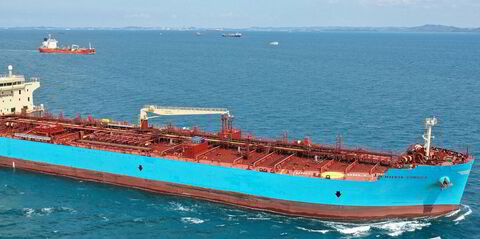Shipowners could use fuel savings to generate new revenue streams, according to Christopher Rex at Danish Ship Finance.
These savings should be used to offer crews financial incentives to cut fuel use, the head of sustainability and research believes.
Vessels on similar routes and of a similar class could be benchmarked to generate a fuel budget for a voyage, he told TradeWinds Wavelength podcast following the latest market report from Danish Ship Finance, where Rex often publishes his ideas.
When vessels perform better than the given budget and save fuel, those cost savings can be shared between stakeholders and a small portion could even go to the ship’s crew.
“The main goal is to introduce a main revenue stream that rewards ship operators that consume less fuel than their peers,” Rex said.
This benchmark would need to be built into the commercial contracts as a fuel budget for the voyage and any fuel left over would be seen as a new revenue stream, he said.
So the value of the new revenue stream is directly related to the performance of the vessel.
Laytime and demurrage
“This stands on the shoulders of the assumption that the cargo counterparts want to reduce emissions,” Rex said.
“If they do not then all this falls apart. But we know there is [regulation for] energy efficiency for 2030 by the IMO and by the EU”.
Rex said he is calling for these structural contracts because shipping has largely only adopted many of the easier measures to improve vessel efficiency.
“I think the industry is stalling as it moves beyond the low-hanging fruit,” he said.
“It needs to go to the next level of abatement, but this can only be carved out if we handle the structural challenges of how the industry is operating.”
This means moving beyond the time constraints written into the laytime for loading and discharging cargoes and demurrage, the fee incurred where a charter remains in possession of a vessel beyond the chartered time under the contract.
Crew bonus
“I think the whole climate agenda is suggesting that we are moving away from very short-term optimisation in the shipping industry towards long-term planning,” Rex said.
He believes ships’ crews should be seen as part of the potential, as well as the technologies.
“To me, it is quite natural to think that if we have to harvest the full potential of the investments we are creating towards energy efficiency, we need to include the crew and we need to incentivise the crew to do their utmost to bring out these energy-saving potentials and thereby increase the return on invested capital.”
Rex realises there will be reluctance towards his ideas, especially with shipping companies that have outsourced crew and technical management.
“That is clearly the traditional model,” he said, “Where both crew and also technical management to a large degree is treated as a cost.”
Rex has seen many shipowners begin to understand that if they are to bring in additional operational savings they need to work much closer with vessel operations and with crew incentives.
“We have to begin to see that if [shipowners] are getting closer to technical management and crew, and then incentivise crew, they are earning more money than if they simply treat them as a cost ”






